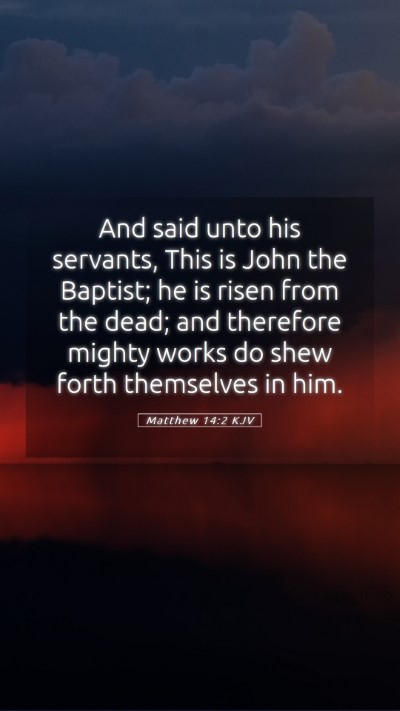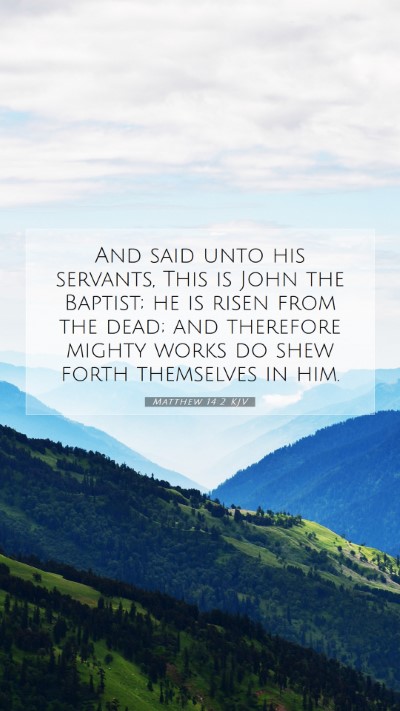Understanding Matthew 14:2
Matthew 14:2 is a pivotal verse in understanding the context and events leading up to the beheading of John the Baptist. The verse reads:
"And said unto his servants, This is John the Baptist; he is risen from the dead; and therefore mighty works do show forth themselves in him."
Verse Meaning Overview
This verse reflects King Herod's fear and guilt over the fate of John the Baptist after having ordered his execution. It highlights themes of recognition, fear of judgment, and the supernatural implications of John's ministry after death.
Commentary Insights
-
Matthew Henry:
Henry comments on how Herod's conscience troubled him, leading him to believe that John the Baptist had risen from the dead. This reflects a significant aspect of human nature—guilt can cause individuals to believe in supernatural explanations for their guilt.
-
Albert Barnes:
Barnes emphasizes the superstition and the fear of Herod regarding the resurrection of John. Herod’s acknowledgment of John’s works being attributed to a risen prophet indicates the profound impact John had during his lifetime and suggests that his death may not have silenced his message.
-
Adam Clarke:
Clarke elaborates on the historical context and the superstitious beliefs of the time, highlighting that Herod attributed miraculous signs to John’s supposed resurrection as a reflection of his own unrest. Clarke notes that Herod’s conscience was not at peace after executing a righteous man.
Thematic Analysis
The themes in Matthew 14:2 extend beyond the mere recounting of events.
-
Conscience and Guilt:
The passage points to how guilt manifests in psychological ways, leading to fear and irrational beliefs.
-
Recognition of Authority:
Herod's recognition of John as a powerful figure reflects the tension between the political and the spiritual authority during Jesus’ time.
Cross References
- Matthew 11:11-14 - Discusses John the Baptist’s significance in relation to Jesus.
- Mark 6:14-16 - Parallel account of Herod’s thoughts about John.
- Luke 9:7-9 - Luke's account of Herod reacting to Jesus' miracles and hearing about John.
Application for Study
For those looking to delve deeper into the meaning of this Bible verse, consider the following:
- Bible Study Groups: Discuss the implications of guilt and how it affects our spiritual lives.
- Online Bible Study: Research John the Baptist's role in the context of Jesus’ ministry.
- Bible Study Guides: Use resources that explain the significance of John’s work and its impact on society at the time.
Closing Thoughts
Understanding Scripture can provide profound insights into our lives today. Matthew 14:2 serves as a reminder of the importance of conscience and the enduring impact of those who live righteously. Reflecting on this verse allows us to explore themes of justice, morality, and the echoes of one's actions even after death.


